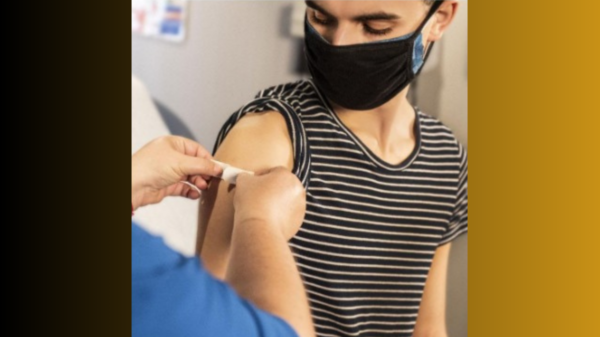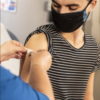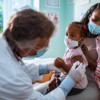
By Dom DiFurio
GeneIQ lab supervisor Dr. Elena Starostina points to a multicolored grid on a computer monitor sitting on a counter. It’s surrounded by white machines the size of commercial printers.
Each machine is running tests to identify genetic material from COVID-19 in dozens of samples swabbed from patients who suspect they may have the disease.
“This is positive,” she says, referring to the smattering of red dots on the grid representing new COVID-19 cases from the latest batch of PCR tests.
There’s fewer now in each batch than in previous weeks.
Just over a month ago, the Dallas-based lab diagnostic company was stretched to its limits.
The omicron wave caught nearly everyone off guard as it spread like wildfire through North Texas. It spread faster than any coronavirus in recorded history, according to some scientists.
North Texans experiencing symptoms over the winter holidays waited two to five hours in line at drive-through sites operated by GeneIQ and, in some cases, five days to a week to learn whether they were infected with COVID-19.
Even inside GeneIQ, employees were calling in sick, compounding the difficulty to deliver for the public, co-owner and director of communications Marisa Howard said.

Chief executive Frank G. Howard, who co-owns the company with wife Marisa, called it a “tsunami” and said it was one of the hardest two weeks of his life.
“We’ve all been working hard for two years and are exhausted,” Howard said. “We had people that were on PTO just because they were exhausted and it was the holidays.”
GeneIQ staffed up rapidly, hiring nearly 100 employees in a matter of weeks, he said.
A lab staff of 142 people covered shifts that operated 24 hours a day, seven days a week, to process around 121,000 PCR tests that have come into the lab since the start of the omicron surge. The company operated roughly 25 drive-through testing locations in the metro area at the peak of demand, and it’s now operating 19 sites that all send samples to the same laboratory in The Colony for processing.
“We don’t want to turn people away, so we did the best we can, and it was challenging,” Howard admitted.
It wasn’t just GeneIQ, either. Other major testing providers in the area were overwhelmed, including national lab giant Quest Diagnostics. Drive-through lines extended onto highways in early January, and lines of cars stretched through multiple intersections in some Dallas neighborhoods.
Developing a playbook
At the peak of demand, GeneIQ said it was finding that nearly 1 in every 2 COVID-19 tests came back positive. That number has fallen closer to 10%, Howard said.
The lab no longer has to operate 24 hours a day, seven days a week, and turnaround times for tests are back down to around 16 hours, he said.
The omicron wave is beginning to subside much like it arrived in North Texas — very quickly. Hospitals are seeing fewer COVID-19 patients, and mostly unvaccinated patients continue to die at numbers comparable to the fall surge driven by the delta variant.
If there’s another wave after omicron, GeneIQ has developed a “playbook” for scaling operations to meet testing demand.
This month, the company is expanding to offer COVID-19 testing services and vaccinations in as many as 20 states outside Texas. Specifically, GeneIQ is targeting small to midsize businesses in states with low vaccination rates and high COVID-19 case counts.
“It’s the small business that probably doesn’t have the infrastructure and needs the assistance,” Howard said. “We’re a small company, and we thought that would be a good place to lend a hand.”
As part of its Workplace Safety program, the company will provide the necessary staff, test kits and vaccines to help businesses provide a safe work environment amid omicron and any future COVID-19 variants.
Since 2020, GeneIQ has partnered with more than 500 private and public companies and institutions, school districts and universities including the Dallas College system and Tarrant County to provide testing and vaccination services.

Howard, who began his career at Merrill Lynch, is a serial entrepreneur who developed a number of businesses over the years under the Gulfstream umbrella before identifying that his strongest skill is “fixing things,” he told The Dallas Morning News.
During the 2008 financial crisis, his Gulfstream Capital Group purchased distressed multifamily apartment complexes and invested $500 million in them, Howard said.
Howard had years of experience managing laboratory and health care businesses. But his previous toxicology diagnostic lab company hit a wall in late 2018 and was forced to file for bankruptcy the following year. The company blamed reduced Medicare reimbursement rates when it defaulted on a $2.5 million loan, according to bankruptcy court records.
“I didn’t move fast enough to level-set our infrastructure … to accommodate for that lack of reimbursement,” Howard said.
Howard said he carried lessons from those previous ventures in the lab management space with him to GeneIQ.
GeneIQ declined to provide financial details about its revenue or whether it is profitable, citing its status as a privately backed company. Business-to-business data software firm ZoomInfo estimates the company’s annual revenue to be less than $5 million.
“The opportunity to serve the community during the COVID pandemic has allowed us to invest in the expansion of our molecular testing portfolio, which includes our exciting pharmacogenomic product offering, as well as the continued investment in our highly committed employee population,” Howard said.
Beyond omicron

The nationwide trend of declining cases raises questions about what happens to all the new diagnostic companies as demand for COVID-19 tests declines.
But Howard said GeneIQ was never intended to be a majority COVID-19 diagnostic lab.
He formed GeneIQ in 2018 with every intention of providing pharmacogenomic PCR testing — a form of testing that analyzes a person’s genes to determine how the body will respond to various medications like antidepressants or antibiotics.
In 2020, he decided that addressing the demand for testing was the best use of his background and skill set as the pandemic gripped the U.S.
With no indication that another variant is looming — for now — Howard said he looks forward to pivoting GeneIQ back to its “main calling” now that PCR testing has become a larger part of U.S. vernacular.
“Our pharmacogenomic test may be very prevalently used to ensure that people are in the right state of mind or taking the right medications. I think it’s all coming full circle,” he said.









You must be logged in to post a comment Login